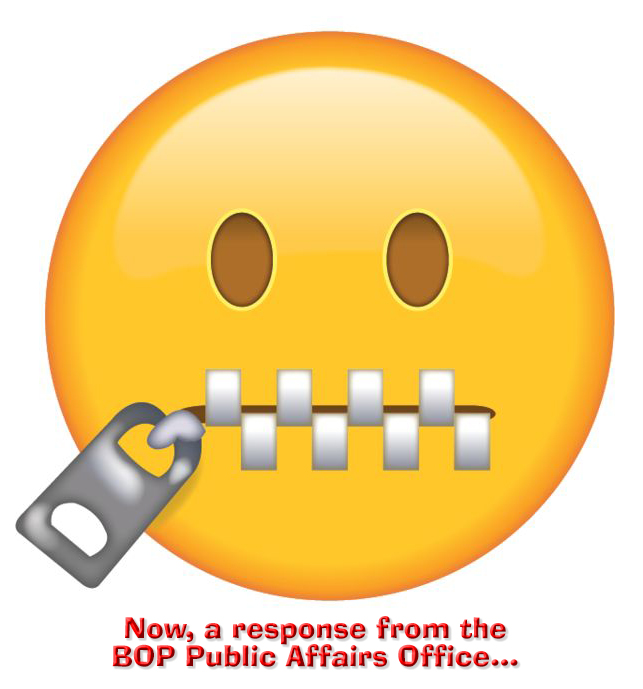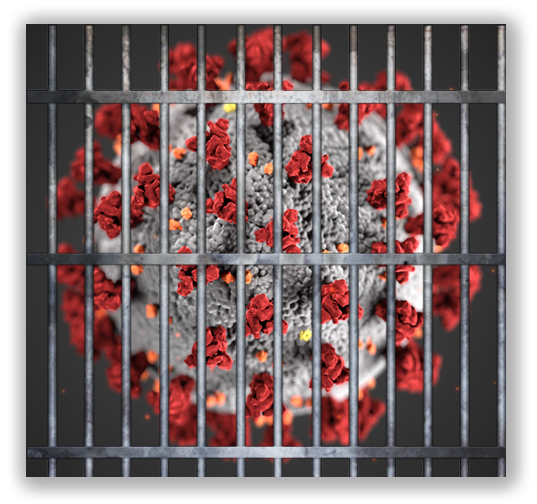We post news and comment on federal criminal justice issues, focused primarily on trial and post-conviction matters, legislative initiatives, and sentencing issues.

BOP SCURRIES TO SUPREME COURT IN BID TO STOP DISTRICT COURT ORDER TO PROTECT VULNERABLE INMATES
Now for the continuing saga of Judge Gwin versus FCI Elkton – in which the Cleveland-based federal judge issued a preliminary injunction against the Federal Bureau of Prisons facility because the conditions of confinement of inmates especially vulnerable to COVID-19 was likely to constitute “deliberate indifference” (a term loaded with 8th Amendment implications)… as the BOP runs to the Supreme Court to complain about an (allegedly) out-of-control federal district court.
 Last month, as we described at the time, Judge James Gwin of the U.S. District Court for the Northern District of Ohio granted a preliminary injunction ordering BOP officials at FCI Elkton (located about 70 miles southeast of Cleveland) to identify, and then to start transferring or releasing to home confinement medically vulnerable prisoners. The BOP promptly appealed this order to the U.S. Court of Appeals for the Sixth Circuit, but the Sixth bounced the appeal in a brief order finding that Judge Gwin had not abused his discretion.
Last month, as we described at the time, Judge James Gwin of the U.S. District Court for the Northern District of Ohio granted a preliminary injunction ordering BOP officials at FCI Elkton (located about 70 miles southeast of Cleveland) to identify, and then to start transferring or releasing to home confinement medically vulnerable prisoners. The BOP promptly appealed this order to the U.S. Court of Appeals for the Sixth Circuit, but the Sixth bounced the appeal in a brief order finding that Judge Gwin had not abused his discretion.
Bartleby the Scrivener has nothing on the BOP. Having lost its interlocutory attempt to force the inmate plaintiffs into interminable trench warfare over their habeas corpus action – and thus let time and inmate attrition take care of Elkton’s coronavirus outbreak – the BOP simply chose to ignore the Judge’s injunction. Last Tuesday, an apparently fed-up Judge Gwin let the BOP know who in the case had a robe and gavel, and who did not.
On Tuesday, the Court ruled that BOP officials had not complied with his directive from last month to clear out Elkton to address the spread of coronavirus, which has already killed nine Elkton inmates (out of 58 federal inmates nationally) and infected over 100 others. The Judge noted that of 837 inmates identified as medically vulnerable to COVID-19, the BOP had “made only minimal effort to get at-risk inmates out of harm’s way. As of May 8, 2020, five subclass members were “pending [home confinement] community placement.” Six inmates were identified as maybe qualifying for home confinement. No inmates were deemed eligible for furlough transfer. But to date, Respondents have not identified any inmates whose confinement has actually been enlarged as a consequence of the preliminary injunction.”
Charitably characterizing the BOP’s efforts to date as “limited,” Judge Gwin ordered the BOP to loosen requirements on who qualifies for placement on home confinement under the Bureau’s CARES Act authority by
• eliminating requirements about length of his or her sentence an inmate has served (reversing the BOP’s position that an inmate had to have served 50% of his or her entire sentence, or 25% and have less than 18 months to go, in order to be eligible);
• disregarding whether they committed had certain low or moderate offenses within the past 12 months (reversing the BOP’s position that any disciplinary report in the past 12 months – from possessing a shank or taking an apple from the chow hall to eat later) – was automatically disqualifying);
• eliminating a BOP requirement that the inmate be a U.S. citizen in order to get CARES Act home confinement placement;
• eliminating the requirement that an inmate with a “low” PATTERN risk score be denied CARES Act home confinement placement; and
• disregarding the fact that an inmate is serving time for a “violent” crime (and “violence” is being defined more broadly by the BOP than by any other government agency interpreting federal law) if the crime occurred more than five years ago.
The judge instructed the BOP to explain in detail to the court why any inmate was denied CARES Act placement or Bureau recommendation for compassionate release furloughed or moved to another facility, the prisons bureau must also explain why.
 The judge’s order observed that “[b]y thumbing their nose at their authority to authorize home confinement, Respondents threaten staff and they threaten low security inmates.”
The judge’s order observed that “[b]y thumbing their nose at their authority to authorize home confinement, Respondents threaten staff and they threaten low security inmates.”
But the BOP immediately struck back. Late yesterday, the BOP filed an application for a Supreme Court stay of Judge Gwin’s preliminary injunction “pending appeal of that injunction to the United States Court of Appeals for the Sixth Circuit and, if the court of appeals affirms the injunction, pending the filing and disposition of a petition for a writ of certiorari and any further proceedings in this Court.”
After the predictable self-serving explanations to the Supreme Court that “the Federal Bureau of Prisons (BOP) is working assiduously to mitigate those risks within its facilities by implementing a multi-phase plan it developed in January 2020,” the application for stay complains that “the district court’s injunction — now augmented by the court’s sweeping May 19 order — would undermine BOP’s systemic response to the COVID-19 pandemic; intrude the Judicial Branch on policy decisions that have been assigned to expert prison administrators; and require BOP to defy the CDC’s guidance to restrict prisoner movements during the pandemic to avoid unnecessary risk of spreading the virus.”
Justice Sonia Sotomayor, who is assigned as Circuit Justice for the Sixth Circuit, has ordered the inmate petitioners to file a response by tomorrow morning.
Order, Dkt. 85, Wilson v. Williams, Case No. 4:20cv00794 (N.D. Ohio, issued May 19, 2020)
Application for a Stay of the Injunction Issued by the United States District Court for the Northern District of Ohio and for an Administrative Stay, Williams v. Wilson, Case No. 19A-____ (Supreme Court, May 20, 2020)
– Thomas L. Root

























